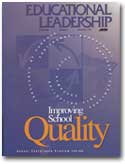As teachers in the United States, we basically play the same role we have for 100 years. We are like “knowledge pharmacists” who dispense information to students as the need arises, offering little pills of English, history, and mathematics. But if we wish to remain viable, necessary contributors in an evolving society, it is time for us to alter our role. No longer can we afford to be the director in front of the classroom, the one who knows what needs to be known and who doles it out piecemeal to students. We need to step back and relinquish our traditional role.
There exists a great deal of irony, perhaps even hypocrisy, for me to be proposing such a call to action. I was a control-oriented, traditional teacher for 20 years, leading my high school English classes around by the nose from the time I began teaching in 1968. It is only since my departure from the public schools and my arrival at the higher levels of academic life three years ago that I have been able to clear the cobwebs from my thinking and see the need for a new definition of teacher.
In truth, I probably continue to lead my education classes to the knowledge I wish them to have, the knowledge I believe will serve them well as teachers in the public schools. I, too, must shift my thinking and design coursework that will allow students just entering the teaching profession to discover philosophies and methods that will best serve them in classrooms over the next 30 years. It will be best if I direct teaching candidates to current research in order to develop their own teaching styles and methodologies, rather than offer them mine. It will serve them best if I encourage them to experiment with newer methodologies such as cooperative learning, portfolio assessment, and inquiry learning rather than only telling them what served me well. I need to allow them in-class teaching opportunities with peer review rather than offer only object lessons and model what has worked successfully for me.
I understand more than many the threat of giving up my traditional role in the classroom. In all my years as an English teacher, I was the one who knew about Hemingway, Hawthorne, and Updike. I was the one who had studied and written poetry, who recognized themes in literature. I had written essays, poems, short stories, and even a novel. I was the expert who encouraged students to become learners, seekers of knowledge, and discoverers of truth so they could live fulfilled and meaningful lives. I still want that for students, but I have learned that educators need to let students discover that for themselves.
It is no longer acceptable for the teacher to be the one with the knowledge. Teachers must become comfortable with students as their own teachers working in cooperative groups to solve problems in a culturally, technologically, and socially evolving environment. We need to rediscover the natural curiosity of students that will lead them to bodies of knowledge and means of discovery that we as teachers can encourage. This will eventually lead to a new respect for public education and, in turn, a new respect for teachers who feel the freedom to offer the freedom of learning to their students.
This is not so much giving up our role as teachers as it is adjusting the role to fit the needs of students in a constantly changing society. A new role awaits, one that will be equally fulfilling for teachers and students alike.
As in the past, teachers need to be at the forefront of educational innovation. Teachers need to be the educational theorists and not leave that job up to people who have not served in the classrooms. Teachers themselves need to be doing research and writing journal articles based on their own experiments in the classroom. Teachers also need to know their own philosophy of education. Are they Idealists? Realists? Perennialists? Essentialists? Are they liberals or conservatives in terms of educational theory? It's important to know from whence we've come in order to know where we're going.
It's not good enough to be a teacher without knowing why, without knowing what it is we are doing that makes us good. Nor is it acceptable to be poor teachers without knowing why, to move through our careers in ignorance at the cost of student interest, at the cost of student love for learning.
